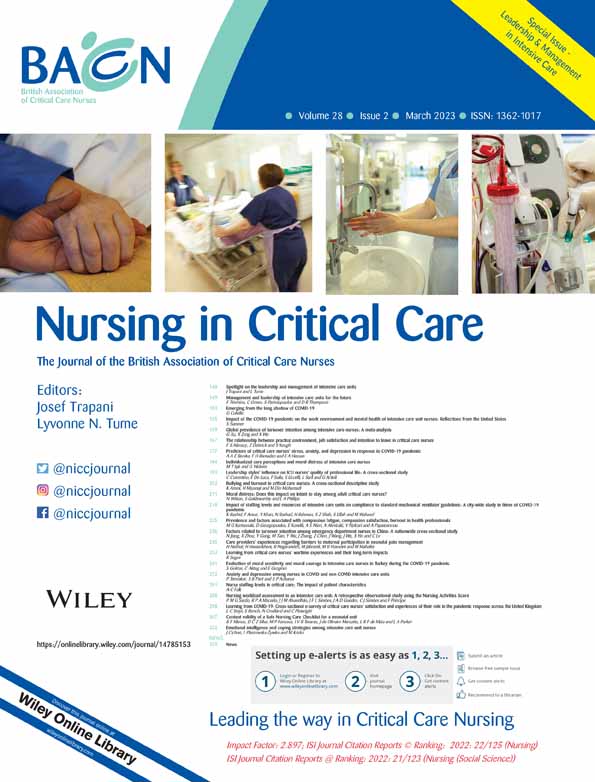Moral distress: Does this impact on intent to stay among adult critical care nurses?
Abstract
Background
Moral distress is recognized as an international problem that contributes to decreased work productivity, job dissatisfaction and intent to leave for adult Critical Care nurses.
Aim
To explore Critical Care nurses moral distress levels using the Moral Distress Scale Revised (MDS-R) and its relationship with intention to stay. The study reported in this paper was part of a larger study that also investigated Critical Care nurses' work environment in Canada and the Midlands region of the UK.
Study design
During January to August 2017 a cross-sectional survey was distributed to adult Critical Care nurses in the Midlands region of the UK.
Methods
Surveys were distributed to adult Critical Care Registered Nurses in the Midlands region of the UK examining moral distress levels and intention to stay in Critical Care, the organization (NHS Trust) and in the nursing profession.
Results
Two hundred sixty-six number of a potential sample of 1066 Critical Care nurses completed the survey (25% response rate). Age and moral distress were significantly positively correlated with intention to stay on their current unit (r = 0.16, P = .05), indicating older nurses were more likely to stay in the critical care unit. Moral distress was negatively correlated with intent to stay scores, showing critical care nurses with higher levels of moral distress were less likely to stay on their unit (r = −0.20, P = .02). Moral distress was also significantly negatively correlated with intention to stay with their current employer (r = −0.28, P < .001). Nurses that stated they had high rates of moral distress were more likely to consider leaving their current employer.
Conclusion
Moral distress appears to be an issue among adult Critical Care nurses requiring further exploration and development of effective strategies to reduce this phenomenon and stabilize the workforce by reducing turnover.
Relevance to clinical practice
By identifying the top causes of moral distress, tools and strategies can be developed to allow the Critical Care nurse to work within an ethically safe clinical environment and reduce the turnover of experienced adult Critical Care nurses.
CONFLICT OF INTEREST
The authors declare no potential conflict of interest.




